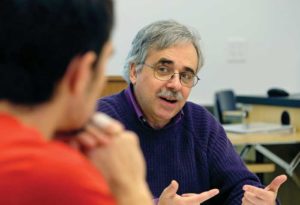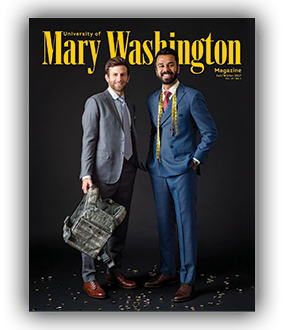
Steve Farnsworth brings real-world knowledge to his teaching thanks to his journalistic background and experience training overseas reporters.
(Norm Shafer)
By Chelyen Davis
Steve Farnsworth doesn’t want his students to swallow everything they hear from politicians.
“What’s important,” the political science professor said, “is that you have a level of resistance to being bamboozled.”
He spoke from his small, book-lined office overlooking the University of Mary Washington campus. Farnsworth is a national political pundit, author of five – soon to be six – books on American politics and the media, and head of the UMW Center for Leadership and Media Studies.
He seeks to impart a deeper understanding of how American politics functions. In his teaching, his work with international journalists from former Soviet countries, and his punditry, he deciphers how the media communicate about politics, how public opinion develops, and how
to find the truth in what we hear from our elected leaders.
In campaigns, honesty often takes a back seat to expediency, he said, and that annoys him. His answer: To help others become “smart consumers of government” who learn to think and evaluate statements and situations for themselves.
“It’s important for them to be able to look critically at politicians and political issues,” Farnsworth said of his students, “to make sure they know what they’re getting when they vote for these people.”
In short, how to resist being bamboozled.
Farnsworth has become one of a handful of political science professors at Virginia universities who regularly appear nationally on television and in print news stories as reporters seek context on political issues.
Journalists call about 250 times a year now, and his take on political issues has appeared in The New York Times, The Washington Post, Canadian CTV, and many other outlets.
“I have a sense of how reporters think,” Farnsworth said.
He should. He used to be one.
Farnsworth spent the first 10 years of his career as a newspaper journalist, covering city government in Kansas City before moving to Washington, D.C., to cover economics. He had two bachelor’s degrees, one in history from the University of Missouri-Kansas City and one in government from Dartmouth College.
He earned a Ph.D. in government from Georgetown University and moved from journalism to academia, but journalism continues to frame his career.
Farnsworth has researched how the media shape public perception of politics, and he believes news outlets must do a better job of explaining complicated policy issues.
He understands what journalists want when they call him. And because he gives them useful information, delivered in a pithy, easy-to-understand way, they call again and again.
UMW President Troy Paino gets a regular report of mentions of Mary Washington in the news. “Nine times out of 10 it’s because of Steve Farnsworth,” he said. “I’m always impressed by how insightful and astute he is on a variety of topics.”
Farnsworth’s public-facing work benefits UMW and the community it serves, Paino said. Farnsworth and scholars like him take seriously the responsibility of helping students – and all citizens – understand complex political issues and be educated participants in the democracy.
“Clearly, he’s respected across the commonwealth and across the country as an expert in politics and someone the media can go to to better understand issues,” Paino said. “That brings very positive attention to Mary Washington.”
Farnsworth doesn’t just study politics and media from his office. He talks to politicians and brings them to speak to his classes. Through the Center for Leadership and Media Studies, he hosts campaign debates – in September, the center hosted two debates for Virginia House of Delegates races – and conducts statewide polling on issues like this year’s governor’s race, which also gives students experience in research.
Farnsworth has led reporter-training seminars in Ukraine, Georgia, Azerbaijan, Lithuania, Latvia, Armenia, Estonia, India, and the Philippines through U.S.-funded programs. That work allows him to explain to foreign journalists how American democratic traditions work, but also to explain to his students how democracies and media work differently abroad.
This hands-on work benefits students, said Distinguished Professor of Political Science Jack Kramer, department chair.
“One of his strongest attributes is that he brings both a very strong academic background … and he brings so much real-world experience directly into the classroom,” Kramer said. “It really improves his pedagogy. He’s not just lecturing out of a textbook.”
Farnsworth has won three UMW faculty teaching awards. This year he was one of only 12 college professors in Virginia to receive the State Council of Higher Education of Virginia’s Outstanding Faculty award, which recognizes instructors who “exemplify the highest standards of teaching, research, and service.”
His students, too, win recognition. Five students Farnsworth mentored have won national writing awards from Pi Sigma Alpha, a 700-chapter national student political science honor society.
Farnsworth believes good writing is a foundational skill.
“There are particular skill sets that are offered in a liberal arts college that make these folks very employable,” he said. “If you develop sound habits of writing and rewriting, if you develop sound habits of being thoughtful before you speak, that leads to success professionally, wherever you might go.”
Former students praise Farnsworth for making material interesting, fostering discussion, and taking a personal interest in them. He invites all students to one-on-one meetings and keeps in touch with former students, passing along news of internships and job opportunities.
Chris Winslow ’01, a lawyer who serves on the Chesterfield County Board of Supervisors, said the lessons he learned from Farnsworth have shaped how he approaches governing in the county. His professor taught him to study issues deeply before acting, which is more important than ever in this era of quick response and sensational politics.
“I like to be thoughtful, and I credit him with pushing me to that place,” Winslow said. “Most modern-day political questions have very complex answers. They deserve thought, they deserve scrutiny, they deserve good judgment. And good judgment comes from being thoughtful.”
Being thoughtful about issues also leads to questioning what you hear, said former student and research assistant Ben Hermerding ’15, now the records manager for the secretary of the commonwealth. Farnsworth taught him that there’s a difference in thinking about politics and simply consuming news.
“Dr. Farnsworth always views everything political with a healthy dose of skepticism,” Hermerding said.
Students describe Farnsworth as perpetually, enthusiastically curious and questioning, and they say he encourages students to debate issues. Emma Valinski ’17, a former student and research assistant, appreciated the free exchange of ideas in class and how Farnsworth never let his own views inhibit the conversation.
“The best part of Professor Farnsworth is you can never tell what he’s thinking,” Valinski said. “He has the best poker face … he never pushed you one way or the other opinionwise.”
William Wadsworth ’17, who will graduate in December, is Farnsworth’s current research assistant and an intern in the office of Virginia Rep. Rob Wittman. He said Farnsworth fostered his interest in research and is more responsible than anyone for his growth as a scholar and as a professional.
“If I hadn’t taken that first class with him, if I hadn’t formed that relationship, I’d be worse off for it.”
